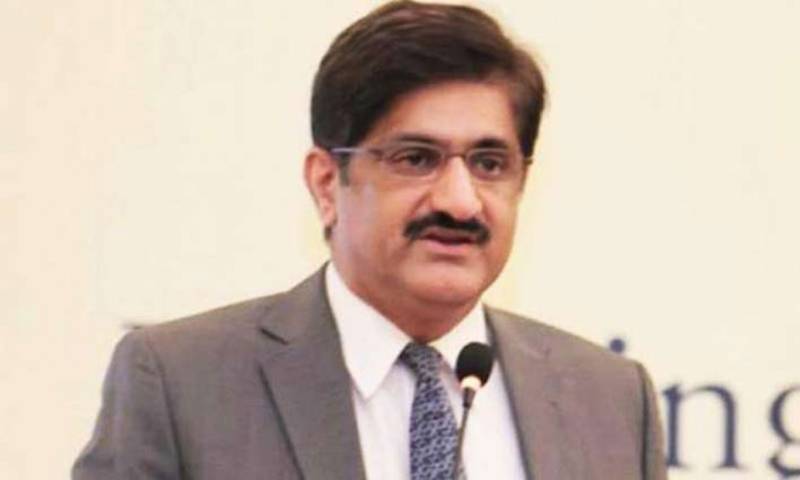KARACHI - Sindh Chief Minister Syed Murad Ali Shah on Tuesday decided to monitor the megacity through 28 dub-divisional committees comprising elected representatives, including ministers, advisors and special assistants for timely and properly disposal of the rain water.
“I need a solid mechanism for saving low-lying areas where rainwater has flooded the houses,” this he said while presiding over a meeting to review monsoon situation and cleanliness of storm water drains, said a spokesperson to the CM Sindh.
The meeting was attended by Sindh ministers Saeed Ghani and Syed Nasir Shah, Chief Secretary Mumtaz Shah, ACS Home Usman Chachar, Commissioner Karachi Iftikhar Shahalwani, Secretary Finance Hassan Naqvi, MD Sindh Solid Waste Management Kashif Gulzar, PD SWEEP Zubair Channa, MD Water Board Khalid Shaikh, Masood Alam of KMC and others.
The Chief Minister said that the local bodies should have an emergency plan to deal with the heavy rain situation in the city.
“The irrigation department maintains a mile-wise protection plan of embankments of their canals under which they mark vulnerable and weak points and take prompt action in case of riverine floods,” he said and added “the local bodies should have a similar plan under which low-lying areas, choking points, bottlenecks, culverts of nullahs and their catchment areas should have been identified on a map so that deployment of concerned staff and necessary machinery could be installed in case of heavy downpour.
Syed Murad Ali Shah said that only cleaning of nullahs was not enough but a detailed plan must be prepared through a proper and professional survey. “Our natural water ways have either been encroached or turned into housing societies, therefore rain water could not flow away in gravity,” he said.
Syed Murad Ali Shah directed the Minister Local Government to remove encroachments from the storm water drains and continue their cleaning under World Bank projects and with local funding of the government.
Minister Local Government Syed Nasir Hussain Shah told the Chief Minister that from July 26 when the rain had started he along with the water board, local government, DMCs senior officers had been on the roads.
“The rain water where accumulated was pumped out through machinery and clearance of choking points that is why all the major roads have been cleared,” he said.
The Chief Minister said that in low lying areas rainwater flooded various houses. “I want a plan under which these houses could be protected,” he said and added that the small nullahs crossing from such residential localities must be maintained properly.
Syed Murad Ali Shah decided to look after the city of Karachi on sub-division level where elected representatives would be assigned the duty to ensure proper discharge of the accumulated rainwater.
It may be noted that there are 28 sub-divisions in Karachi division and every sub-division is headed by an assistant commissioner.
The local government minister, on the directives of the Chief Minister, chaired a joint meeting of water board, DMCs, KMC and SSWMA officers to identify choking points on the main roads, residential and commercial areas for necessary action so that further action could be taken accordingly.
Meanwhile, Sindh Minister for Information and Local Government Syed Nasir Hussain Shah has said that the real public representatives are those who live among the people on the streets of the city and fight for their problems, Karachi’s record-breaking rains proved who has the pain of the people and who is being intimidated by the public reaction.
Nasir Hussain Shah was on an emergency visit to the city on Tuesday morning in which he was accompanied by Secretary Local Government Roshan Sheikh and a large number of media representatives.
Nasir Shah Ali had been visiting various underpasses, drains, main highways and checkpoints of the city since morning where he appreciated the performance of the staff engaged in the relief work and later issued necessary orders.
Talking to media persons, Nasir Hussain Shah said that the overall situation of the city was improving and a large number of choking points and storm drains had been cleared. In response to a question, Nasir Hussain Shah said that the developed countries of the world were also vulnerable to natural storms and floods. Let’s just say, Karachi which is located on the beach, a coastal, densely populated city with numerous slums and suburban settlements in the past. The problems of this city are as complex as the population. The Sindh government, along with the city’s elected local government leadership, had taken emergency measures before the monsoon arrived, but some delays in cleaning the drains were due to late receipt of funds from the World Bank. “We had entrusted the entire task of cleaning the drains to Mayor Karachi Wasim and Project Director Click Zubair Channa, which was largely successful,” he added.
The provincial minister admitted that some areas of the city were affected by urban flooding, but Nasir Shah said that the settlements that were flooded were actually the settlements on the west side of the city. Water flows downhill from the hills of Manghopir and Qasba Colony. In this whole process where the Water Board, Solid Waste Management Board, DMCs, KMC and other agencies were involved in relief activities, the role of welfare agencies cannot be denied. The Sindh government is using all its resources and manpower for the welfare of the people, but govt appeal to people for cooperation. If the opponents cannot help, at least do not create an atmosphere of fear. Shah said, PPP Would together clean and maintain the Karachi.






